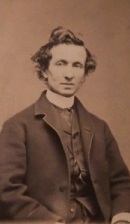‘Dramatic Effects’: 19th-Century Theater as Epicenters of Social Networking
Think about this word: melodrama. What image comes to mind?
Brooklyn College theater historian Amy E. Hughes began her presentation at the 2019 American Library Association Midwinter Meeting with that short thought experiment, asking attendees to picture melodrama.
Did you “see” what they did?
Many in the audience had envisioned something akin to the “Railroad Rescue,” a scene that originated in Augustin Daily’s Under the Gaslight, a popular play which premiered in New York City in 1867. But as Hughes would reveal, the “Railroad Sensation”—as it was called then—has a “surprisingly complicated and convoluted history.” View the full presentation.
Throughout her talk, titled “Dramatic Effects: The Impact of Theater on 19th-Century U.S. Culture and Society,” Prof. Hughes provided a fascinating overview of the 19th-century theater industry. She shared some of the discoveries her recent research has re vealed, and she unpacked the little-known history of that “Railroad Rescue,” pointing out its significant political and social factors.
vealed, and she unpacked the little-known history of that “Railroad Rescue,” pointing out its significant political and social factors.
As a scholar, Prof. Hughes investigates the relationship between theater/performance and visual, print and material culture in the United States, focusing on the 19th century. A key figure in her research has been Harry Watkins, “a minor actor, playwright and stage manager who managed to eke out a living in the theater for more than 40 years.” What is most remarkable about Watkins, Hughes explained, is his unremarkable career. Watkins’ diary, kept from 1845 to 1860, is a window into the typical experience of someone in theater during that time, recording “the plays he saw, the people he met, and the political and social events he witnessed.”
“By reading the diary alongside published dramas—like the ones available in the new Readex database [Nineteenth-Century American Drama]—historical newspapers, theater records, and other ephemera, I have been able to identify gaps in scholarship about entertainment culture during the 1800s or outright errors…” Hughes said.
Prof. Hughes shared some of her findings:
As Hughes notes, many scripts have been completely lost because they were never intended to be preserved. The only evidence of certain plays remains in playbills, newspaper advertisements, and casting records kept by stage managers.
“As these materials are digitized and made available online, we’re gaining a more nuanced understanding of the content and craft of 19th-century theater making,” Hughes said. “We still have much to learn about how theater served as epicenters of social networking long before Twitter and Facebook. Like taverns, lyceums, libraries and masonic lodges, playhouses served as community centers, providing opportunities for socializing and politicizing.”
We hope to see you at a future Readex breakfast event! Please let your Readex account executive know you would like to receive an invitation.
To watch previous ALA breakfast presentations hosted by Readex, visit our Event Talks page.



